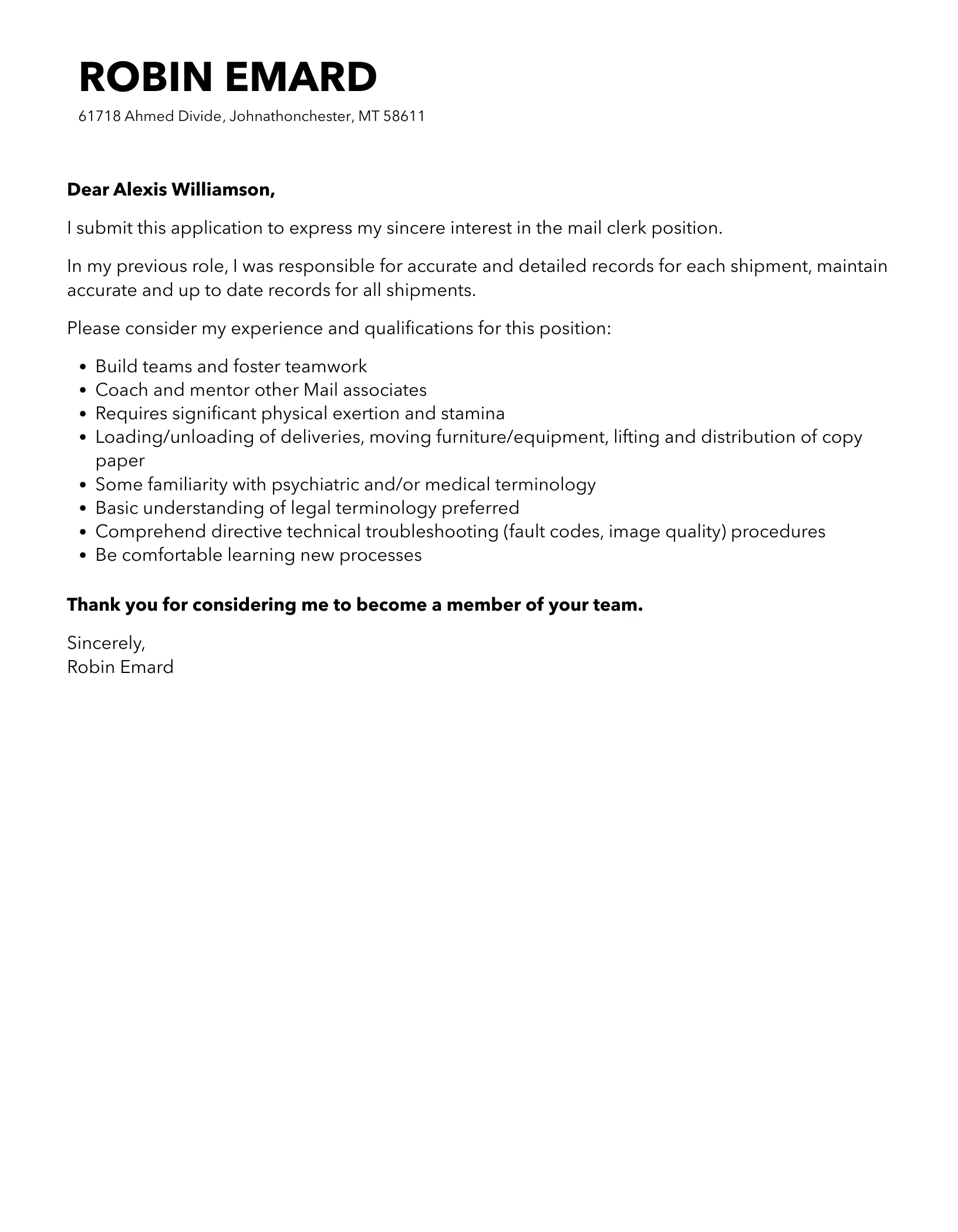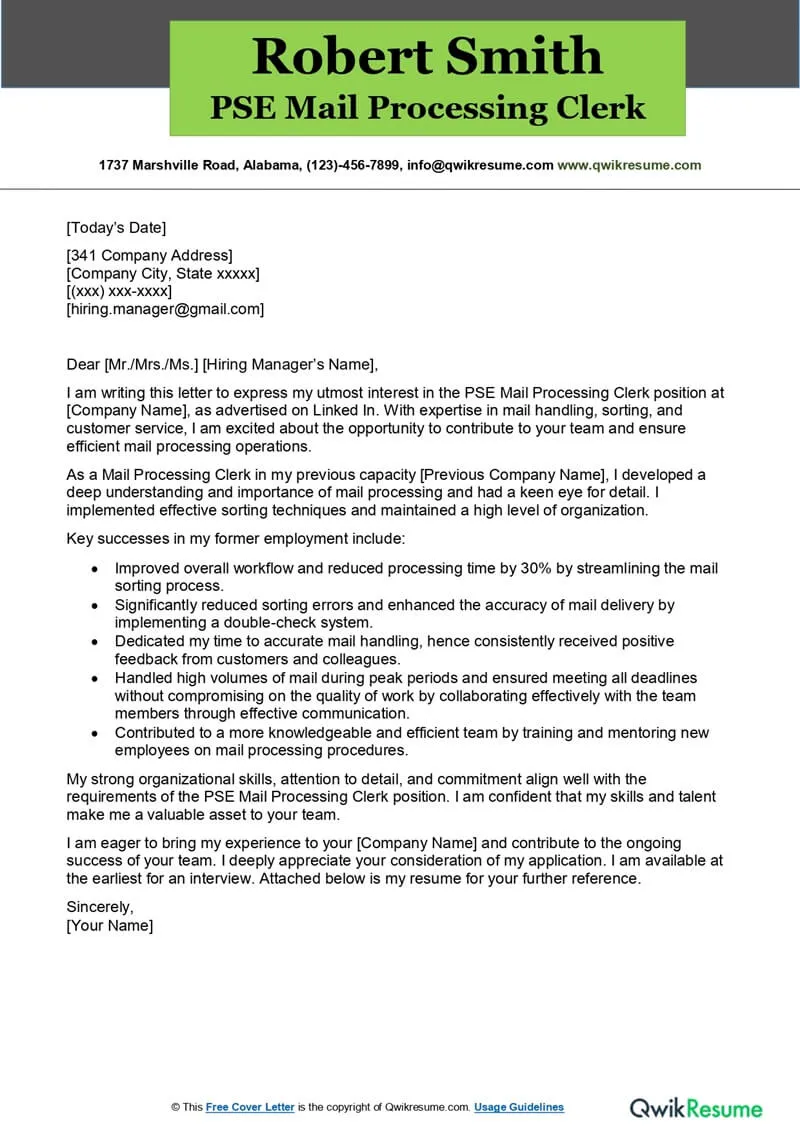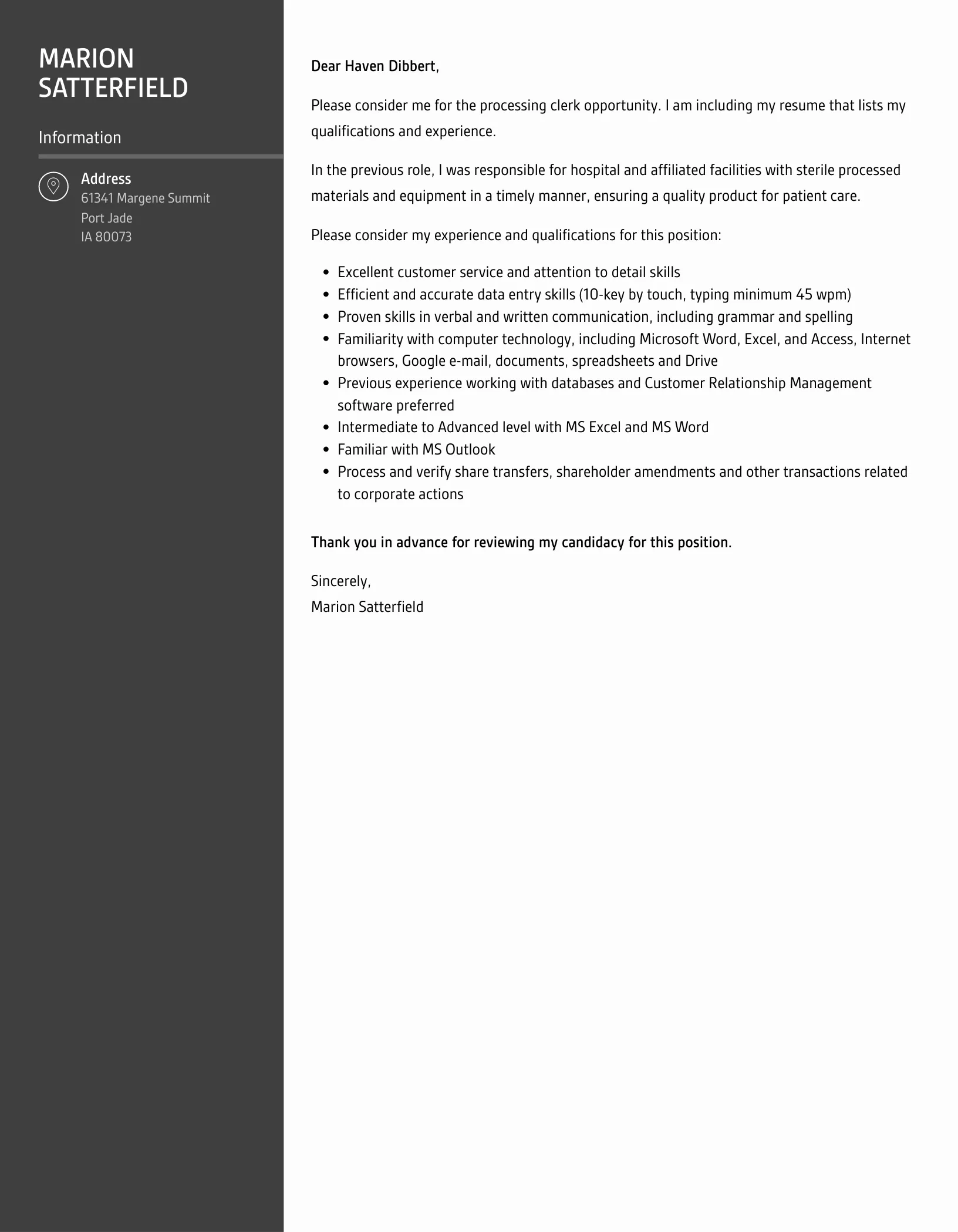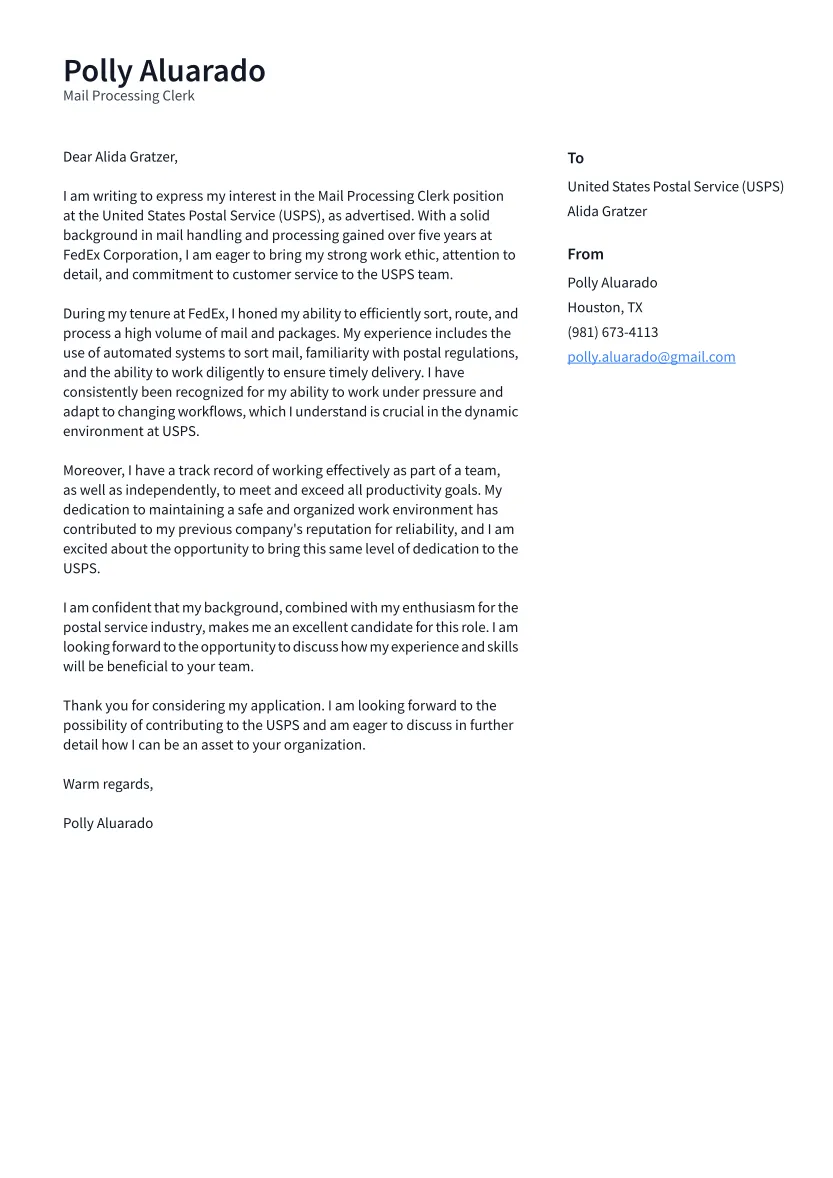Essential Skills for a Mail Processing Clerk
A Mail Processing Clerk plays a critical role in the efficient operation of postal services and mailrooms across various industries. Their duties involve sorting, processing, and distributing mail and packages, ensuring that everything reaches its intended destination. The role requires a blend of physical abilities, technical skills, and personal attributes. In today’s fast-paced world, where the timely delivery of mail is more crucial than ever, mastering these skills can significantly enhance a mail processing clerk’s performance and career prospects. Understanding these skills will help you demonstrate your qualifications effectively in your cover letter and during interviews, positioning you as a strong candidate for the job. This guide will provide a clear understanding of the core competencies needed to excel in this role.
Attention to Detail
Attention to detail is paramount for a Mail Processing Clerk. The job demands meticulousness in handling various types of mail, from letters to parcels of different sizes and weights. This involves carefully examining addresses, ensuring they are complete and correct. The ability to spot discrepancies, such as incorrect zip codes or illegible handwriting, can prevent mail from being misdirected. This skill also extends to accurately sorting mail into designated categories and processing them according to established procedures. Without this skill, errors can result in delays, misdelivery, and potential loss of important documents or packages. In a fast-paced environment, the ability to maintain focus and accuracy is essential for maintaining operational efficiency. This includes the ability to differentiate between similar-looking addresses or codes, and to double-check work to minimize mistakes.
Accuracy in Mail Handling

Accuracy in mail handling is closely linked to attention to detail but goes a step further by emphasizing the correct execution of each task. This means correctly sorting mail, using the right equipment (such as scales and sorting machines), and adhering to all protocols established by the postal service or the specific mailroom. It also includes ensuring that packages are properly labeled and that tracking information is accurately entered into the system. Errors in this area can lead to a breakdown in the entire mail delivery process, resulting in customer dissatisfaction and potential legal or financial consequences. Accuracy helps reduce the risk of mail being lost, delayed, or delivered to the wrong address, which directly impacts the overall efficiency of mail services. A high level of accuracy demonstrates the commitment to the role and reliability, which are highly valued traits in a mail processing clerk.
Speed and Efficiency
Speed and efficiency are crucial in mail processing due to the high volume of mail that must be handled on a daily basis. A Mail Processing Clerk should be able to quickly and accurately process large quantities of mail while adhering to deadlines. This involves efficiently using sorting machines, quickly deciphering addresses, and moving mail through the processing stages without unnecessary delays. The ability to work swiftly and maintain a consistent pace is vital for meeting daily quotas and ensuring timely delivery. Efficient clerks are able to organize their workspace, prioritize tasks, and manage their time effectively to maximize productivity. In a role where timeliness is key, the ability to maintain speed and efficiency directly contributes to the smooth operation of the mailroom and the overall satisfaction of customers and recipients.
Time Management Abilities
Effective time management is critical in a mail processing role, as clerks often face tight deadlines and a constant flow of incoming mail. This skill involves prioritizing tasks, organizing the workload, and allocating time efficiently to ensure that all duties are completed within the given timeframe. A Mail Processing Clerk must be able to manage multiple tasks simultaneously, such as sorting, labeling, and preparing mail for dispatch, without letting any aspect fall behind. This includes the ability to estimate how long specific tasks will take and adjust the work schedule accordingly. Time management also involves minimizing distractions and maintaining focus, even under pressure. Good time management skills not only increase productivity but also reduce stress, enabling clerks to consistently meet deadlines and maintain the flow of mail processing operations.
Physical Stamina and Dexterity

The role of a Mail Processing Clerk is physically demanding, requiring both physical stamina and dexterity. Clerks must be able to stand for extended periods, often handling heavy packages and moving large volumes of mail. This includes lifting, carrying, and sometimes pushing or pulling carts loaded with mail. Good physical stamina is necessary to maintain this level of activity throughout the workday without fatigue. Dexterity, or the ability to use hands and fingers skillfully, is also essential for tasks such as sorting mail, operating machinery, and handling small items. The ability to perform these tasks with precision and efficiency is crucial for maintaining accuracy and speed. The physical demands of the job mean that clerks must also be aware of proper lifting techniques and safety procedures to prevent injuries and ensure a safe working environment.
Teamwork and Communication
Mail Processing Clerks often work as part of a larger team, making teamwork and communication essential skills. The ability to work collaboratively with colleagues to achieve common goals is crucial. This involves sharing information, assisting coworkers when needed, and coordinating tasks to ensure the smooth flow of operations. Effective communication skills are also necessary for interacting with supervisors, coworkers, and potentially, customers. This includes clearly conveying information, asking relevant questions, and listening actively to instructions and feedback. Clear and concise communication helps prevent misunderstandings and ensures that everyone is aligned on procedures and goals. Teamwork and communication skills contribute to a positive work environment, which increases productivity, reduces errors, and improves overall job satisfaction.
Knowledge of Postal Regulations
A Mail Processing Clerk must have a solid understanding of postal regulations and procedures. This knowledge is essential for ensuring that mail is handled correctly and complies with all legal requirements. It includes understanding different mail classes (e.g., first class, priority mail, and media mail), knowing the proper way to address mail, and being familiar with regulations regarding prohibited items and hazardous materials. Staying updated on changes to postal regulations is also a critical aspect of the job. Knowledge of these regulations helps clerks avoid errors, prevent delays, and ensure compliance with laws. It also helps in making informed decisions when handling complex or unusual mail items. This knowledge directly contributes to the overall efficiency and integrity of the mail processing operations.
Bonus Skills for Mail Processing Clerks

While the core skills are fundamental, some additional skills can significantly enhance a Mail Processing Clerk’s performance and career prospects. These bonus skills can set a clerk apart from others and contribute to greater efficiency and effectiveness. Developing these skills can be a great way to advance within the role and possibly move into supervisory positions. The ability to learn new skills is a key to success in any role.
Familiarity with Sorting Machines
Familiarity with sorting machines is a significant advantage for a Mail Processing Clerk. Modern mailrooms often use automated sorting machines to process high volumes of mail quickly. Being able to operate these machines, troubleshoot minor issues, and understand their functions is crucial for maximizing efficiency. This includes knowing how to load mail correctly, adjust settings, and interpret error messages. Experience with different types of sorting equipment, from basic letter sorters to more complex automated systems, can greatly enhance a clerk’s ability to handle large volumes of mail accurately and efficiently. This skill also positions the clerk well for advancement and further training in more specialized roles.
Data Entry Proficiency
Data entry proficiency is also a valuable asset for a Mail Processing Clerk. Clerks often need to enter data into tracking systems, record mail details, and update databases. Accuracy and speed in data entry are essential to ensure that information is correctly recorded and easily accessible. This includes the ability to use computer software proficiently, understand different data formats, and maintain confidentiality. Data entry skills also contribute to the ability to track mail effectively, locate missing items, and provide accurate information to both internal staff and external customers. Developing these skills can significantly enhance a clerk’s overall productivity and efficiency, making them an invaluable asset in the mail processing environment.
In conclusion, the role of a Mail Processing Clerk requires a combination of practical skills, physical abilities, and a commitment to accuracy and efficiency. From attention to detail and accuracy in mail handling to time management and physical stamina, each skill plays a crucial role in the effective operation of mail services. By mastering these skills and continuously seeking to improve, Mail Processing Clerks can excel in their roles and contribute to the smooth and timely delivery of mail, which is essential for both personal and business communications. Focusing on these essential skills will also greatly aid those writing their cover letter to stand out and improve their chances of securing the role.
